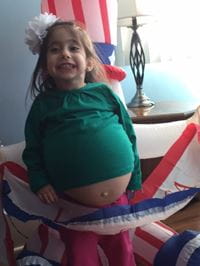“Adults would stare, and kids would come up and ask if she had a baby in her tummy,” says Justine Harbin of Weirton, WV, about her daughter, Mia, 4. Mia has polycystic kidney disease (PKD). So does Ms. Harbin, and Mia’s two sisters, Lilly and Kennedy. That’s why the appearance of Mia’s kidneys on the ultrasound didn’t come as much of a surprise to her (“They took up her whole stomach,” she says). Neither did the official diagnosis of PKD that was made shortly after Mia’s birth.
The Surprising Part
“Mia’s kidneys were enormous,” says Christina Nguyen, MD, medical director of Pediatric Kidney Transplant Program at UPMC Children’s Hospital of Pittsburgh and Mia’s primary Nephrologist. “A year before her transplant, Mia’s kidneys were over three times the normal length, let alone volume. When you picked her up to put her on the examination table, you could feel the cysts between your fingers. I’ve never seen anything remotely like the degree of PKD that Mia had.”
“A year before her transplant, Mia’s kidneys were over three times the normal length, let alone volume. When you picked her up to put her on the examination table, you could feel the cysts between your fingers. I’ve never seen anything remotely like the degree of PKD that Mia had.”
PKD is a genetic disorder in which kidneys develop cysts filled with fluid that can grow and cause damage, leading to kidney failure. Other complications include liver damage and high blood pressure. Mia’s liver wasn’t involved, but her blood pressure became increasingly hard to control, despite being on four different medications at once. Soon, signs of congestive heart failure appeared, and Mia would easily become tired and short of breath. The tiniest kid in her class, she was also falling off the growth curve for her age.
Time to Act
Failing kidneys aren’t always removed, but if they’re infected, or if there isn’t room for them, they will be, in a procedure called a nephrectomy. Nephrectomies and transplants aren’t typically performed together. Patients with PKD most often undergo the nephrectomy first, then stay on dialysis for months or years until his or her doctors determine that the time is right for a transplant.
But not this time. “We thought that Mia was not the best candidate for dialysis, for a couple of reasons,” says Dr. Nguyen. “The family lives an hour-and-a-half away, so the burden of coming to Pittsburgh three, four, five times each week was a huge undertaking.”
As it happens, there was an even better reason: Abhinav Humar, MD, division chief of UPMC Transplant Surgery, was willing to perform the nephrectomy and transplant as part of the same surgery. “Our nephrology team is experienced, and we have the surgical expertise to back it up,” he says “We transplant children that maybe other centers are reluctant to transplant, or they make them wait.”
In June 2016, Mia had both kidneys removed and received a transplant from a live donor. The procedure took under six hours, and during it, Mia went from 35 to 25 pounds—shedding 10 pounds of kidney. “There was almost more kidney than Mia in there,” says Ms. Harbin.
After Transplant
To say that Mia rebounded from the surgery would be an understatement. Mia's high blood pressure resolved during her hospital stay, and Dr. Nguyen believes that her symptoms of congestive heart failure will resolve with time. She’s shown great catch-up growth, and is making up with lost time when it comes to running, and, says her mom, bossing everyone around.
“To see her blossom and thrive and chase her sister down the hallway – she’s doing things she could never do before,” says Dr. Nguyen. “It’s like this huge burden was just taken from her, and she’s just the picture of what you want a kid to be at that age. That’s why we transplant.”









